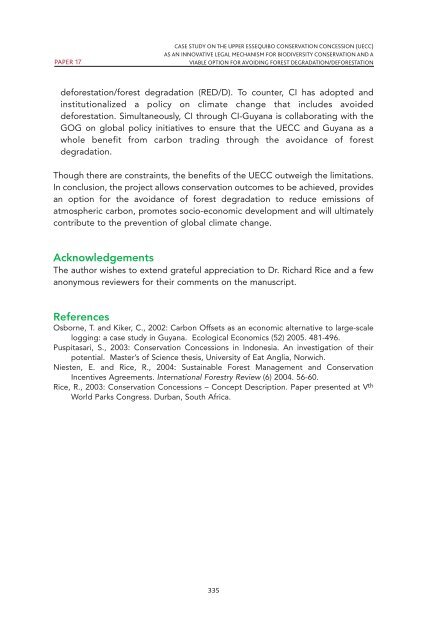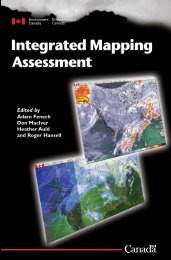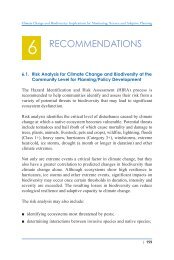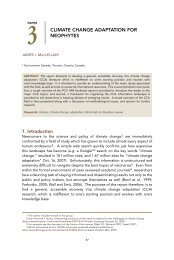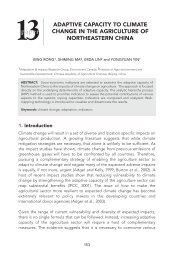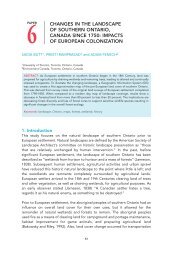Paper 17: Case Study on the Upper Essequibo ... - UPEI Projects
Paper 17: Case Study on the Upper Essequibo ... - UPEI Projects
Paper 17: Case Study on the Upper Essequibo ... - UPEI Projects
You also want an ePaper? Increase the reach of your titles
YUMPU automatically turns print PDFs into web optimized ePapers that Google loves.
PAPER <str<strong>on</strong>g>17</str<strong>on</strong>g><br />
CASE STUDY ON THE UPPER ESSEQUIBO CONSERVATION CONCESSION (UECC)<br />
AS AN INNOVATIVE LEGAL MECHANISM FOR BIODIVERSITY CONSERVATION AND A<br />
VIABLE OPTION FOR AVOIDING FOREST DEGRADATION/DEFORESTATION<br />
deforestati<strong>on</strong>/forest degradati<strong>on</strong> (RED/D). To counter, CI has adopted and<br />
instituti<strong>on</strong>alized a policy <strong>on</strong> climate change that includes avoided<br />
deforestati<strong>on</strong>. Simultaneously, CI through CI-Guyana is collaborating with <strong>the</strong><br />
GOG <strong>on</strong> global policy initiatives to ensure that <strong>the</strong> UECC and Guyana as a<br />
whole benefit from carb<strong>on</strong> trading through <strong>the</strong> avoidance of forest<br />
degradati<strong>on</strong>.<br />
Though <strong>the</strong>re are c<strong>on</strong>straints, <strong>the</strong> benefits of <strong>the</strong> UECC outweigh <strong>the</strong> limitati<strong>on</strong>s.<br />
In c<strong>on</strong>clusi<strong>on</strong>, <strong>the</strong> project allows c<strong>on</strong>servati<strong>on</strong> outcomes to be achieved, provides<br />
an opti<strong>on</strong> for <strong>the</strong> avoidance of forest degradati<strong>on</strong> to reduce emissi<strong>on</strong>s of<br />
atmospheric carb<strong>on</strong>, promotes socio-ec<strong>on</strong>omic development and will ultimately<br />
c<strong>on</strong>tribute to <strong>the</strong> preventi<strong>on</strong> of global climate change.<br />
Acknowledgements<br />
The author wishes to extend grateful appreciati<strong>on</strong> to Dr. Richard Rice and a few<br />
an<strong>on</strong>ymous reviewers for <strong>the</strong>ir comments <strong>on</strong> <strong>the</strong> manuscript.<br />
References<br />
Osborne, T. and Kiker, C., 2002: Carb<strong>on</strong> Offsets as an ec<strong>on</strong>omic alternative to large-scale<br />
logging: a case study in Guyana. Ecological Ec<strong>on</strong>omics (52) 2005. 481-496.<br />
Puspitasari, S., 2003: C<strong>on</strong>servati<strong>on</strong> C<strong>on</strong>cessi<strong>on</strong>s in Ind<strong>on</strong>esia. An investigati<strong>on</strong> of <strong>the</strong>ir<br />
potential. Master’s of Science <strong>the</strong>sis, University of Eat Anglia, Norwich.<br />
Niesten, E. and Rice, R., 2004: Sustainable Forest Management and C<strong>on</strong>servati<strong>on</strong><br />
Incentives Agreements. Internati<strong>on</strong>al Forestry Review (6) 2004. 56-60.<br />
Rice, R., 2003: C<strong>on</strong>servati<strong>on</strong> C<strong>on</strong>cessi<strong>on</strong>s – C<strong>on</strong>cept Descripti<strong>on</strong>. <str<strong>on</strong>g>Paper</str<strong>on</strong>g> presented at V th<br />
World Parks C<strong>on</strong>gress. Durban, South Africa.<br />
335


